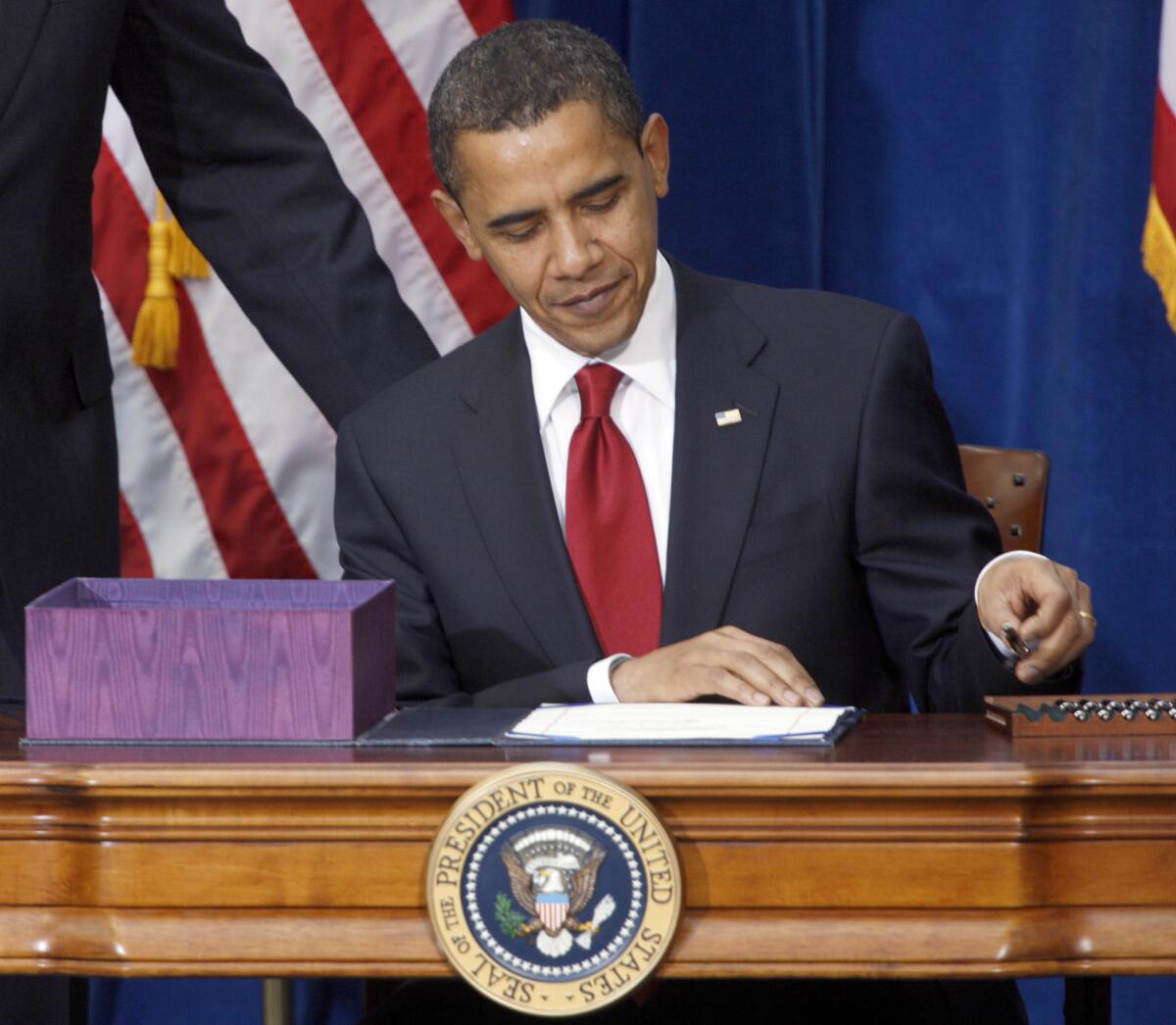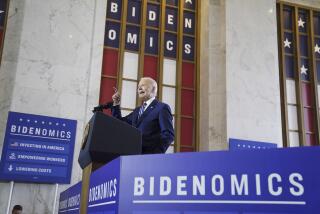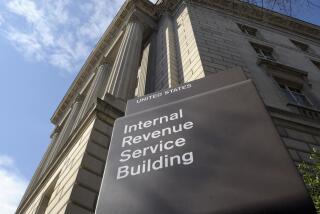Five years later, White House and critics fight over stimulus law

- Share via
WASHINGTON – Five years after its passage, White House officials and their Republican critics are still fighting over the merits of President Obama’s economic stimulus law.
Later this week, Obama will mark the fifth anniversary of signing the American Recovery and Reinvestment Act. Monday, his Council of Economic Advisers issued a 70-page report lauding the law’s impact. Republicans, meanwhile, seized the anniversary to denounce the law for increasing the federal debt while failing to cure the economy’s troubles.
Beyond providing evidence for William Faulkner’s oft-quoted line that “the past is never dead. It’s not even past,” the dispute underlines how important the economic stimulus plan remains to the central battle between the two parties – the role of government in the economy.
As told by Democrats, the stimulus law is a tale of officials using government effectively to shield families from a severe economic crisis triggered by inadequately regulated speculation. In that accounting, the law is a prime example of how a strong central government can help the average person.
To Republicans, by contrast, the law provides proof that government spending does little other than to burden future generations with debt.
Given the continued weakness in the economy, Republicans have the simpler case to make: Good times have not yet returned, therefore, Obama’s policies have failed.
Florida Sen. Marco Rubio demonstrated the approach in a videotaped message, which he opened by referring to the anniversary of the “failed stimulus program.”
“Five years later, underemployment is still too high, the number of people that have dropped out of the workforce is astounding, unemployment remains stubbornly high and our economy isn’t growing fast enough,” Rubio said.
As White House officials see it, that argument is not just simple, but simplistic. Financial crises like the one that hit the U.S. in the final year of George W. Bush’s tenure inflict long-term damage on an economy, they note. Comparing policy outcomes with an ideal result – a rapid, sustained recovery that quickly restores the economy to health – poses an impossible test. The correct approach is “comparing what actually happened with what might have happened,” the report from the economic advisors says.
By that standard, the stimulus law succeeded because it “helped avert what might have become a second Great Depression and paved the way for stronger economic growth,” they say. While economic growth still lags behind what most Americans would like, the U.S. economy has recovered more quickly than many major competitors, including Great Britain and France and pretty much on parallel with Germany, they note.
Overall, the report said, the stimulus law and subsequent economic policies had increased employment by about 1.6 million jobs a year through the end of 2012 and had increased economic output by between 2 and 3 percentage points.
That’s consistent with a previous estimate put out by the nonpartisan Congressional Budget Office, which estimated that in 2010, the year of its biggest impact, the stimulus law had increased output by between 0.7 and 4.1 percentage points. The law also kept the poverty rate from rising significantly, despite the depth of the recession, the report noted.
The report also disputes the Republican claim that the stimulus law added significantly to the government’s long-term debt. The law increased spending by about $805 billion through the end of fiscal year 2013. But given the amount of money the government is expected to borrow over the next 75 years, primarily to finance Social Security and Medicare benefits, that added spending to help the economy recover would add “less than 0.1 percentage point” to the debt burden, the report states.
Most voters aren’t economists and based their judgments about policies heavily on what they see in front of them. White House officials continue to hope for a spurt of sustained economic growth that would close out Obama’s tenure on a note of vindication. That could yet happen – many economists forecast that growth in 2014 and the following two years will be substantially better than the tepid rates of the past couple of years.
Until it does, however, concerns about the economy likely will remain at the fore. A Gallup Poll released Monday showed that unemployment and jobs topped the list of Americans’ concerns this month. Unemployment and the economy have topped the survey most months since a year before Obama took office. And so long as Americans remain deeply worried about the economy, even the strongest economic arguments likely will leave many Americans unconvinced.
Twitter: @DavidLauter
More to Read
Get the L.A. Times Politics newsletter
Deeply reported insights into legislation, politics and policy from Sacramento, Washington and beyond. In your inbox twice per week.
You may occasionally receive promotional content from the Los Angeles Times.











